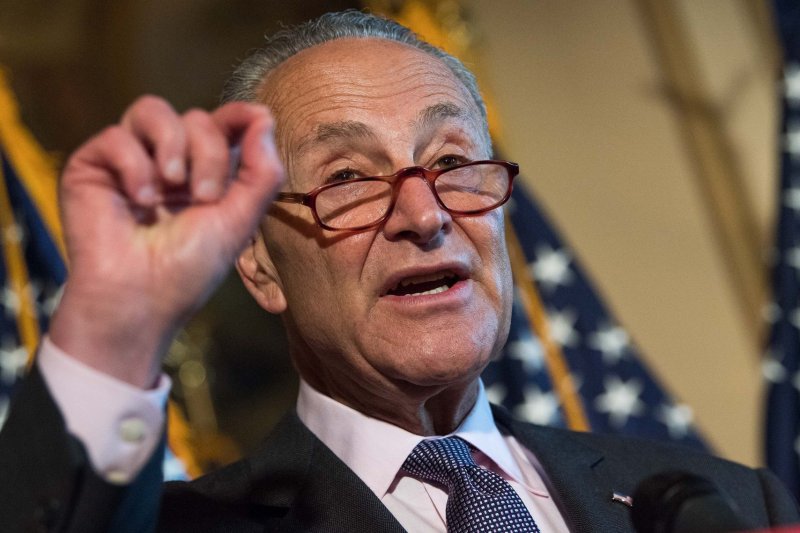Senate Democratic leader Charles Schumer, D-N.Y., introduced the resolution, which opposes Russian President Vladimir Putin's suggestion of questioning U.S. officials, including former Ambassador Michael McFaul. File Photo by Kevin Dietsch/UPI |
License Photo
July 19 (UPI) -- The U.S. Senate on Thursday unanimously passed a resolution in opposition to Russia questioning any U.S. officials as Russian President Vladimir Putin suggested during Monday's summit.
The resolution comes on the heels of growing concerns over the White House's initial willingness to agree to Putin's proposal.
During his summit Monday with President Donald Trump, the Russian president invited the team of special counsel Robert Mueller to Russia to observe the questioning of 12 Russian intelligence officers. Mueller's team indicted the GRU officers for allegedly being involved in a cyberattack against the Democratic National Committee and former Secretary of State Hillary Clinton.
Putin made the offer in exchange for the United States allowing Russia to question people "who have something to do with illegal actions in the territory of Russia."
On Wednesday, White House press secretary Sarah Sanders said the Trump administration would consider allowing Russians to question Americans. She backtracked Thursday afternoon.
"It is a proposal that was made in sincerity by President Putin, but President Trump disagrees with it," she said. "Hopefully President Putin will have the 12 identified Russians come to the United States to prove their innocence or guilt."
The Senate, though, made their stance on the suggestion official with a resolution introduced by Sens. Chuck Schumer, D-N.Y., Bob Menendez, D-N.J., and Brian Schatz, D-Hawaii.
"Today the Senate came [together] in a bipartisan way to declare what should have already been obvious -- it's neither the policy nor the practice of the United States to submit our citizens, let alone our ambassadors like former [Ambassador Michael McFaul], to the interrogation of a foreign adversary," Schumer said after the passage of the resolution.
The resolution passed 98-0, with neither Sens. John McCain, R-Ariz., or Richard Shelby, R-Ala., voting.
The vote comes amid general backlash from U.S. lawmakers and leaders, particularly for remarks at a joint news conference in which Trump accepted Putin's insistence that Russia did not interfere in the 2016 election -- a conclusion at sharp odds with the entire U.S. intelligence community.
"They said they think it's Russia. I have President Putin; he just said it's not Russia," Trump told reporters at the conference. "I will say this: I don't see any reason why it would be."
Then on Tuesday, Trump backpedaled and said he misspoke. He also said he has faith in U.S. intelligence agencies.
"In a key sentence in my remarks, I said the word 'would' instead of 'wouldn't,'" Trump said.
Earlier Thursday, Trump said he looks forward to a second summit with Putin.
In a series of tweets, Trump said he's been tough on Russia and has said numerous times in the past he believes the Kremlin interfered in the 2016 U.S. election. He also took issue with critics calling the Helsinki summit a failure.
"The Summit with Russia was a great success, except with the real enemy of the people, the Fake News Media," he tweeted. "I look forward to our second meeting so that we can start implementing some of the many things discussed."















